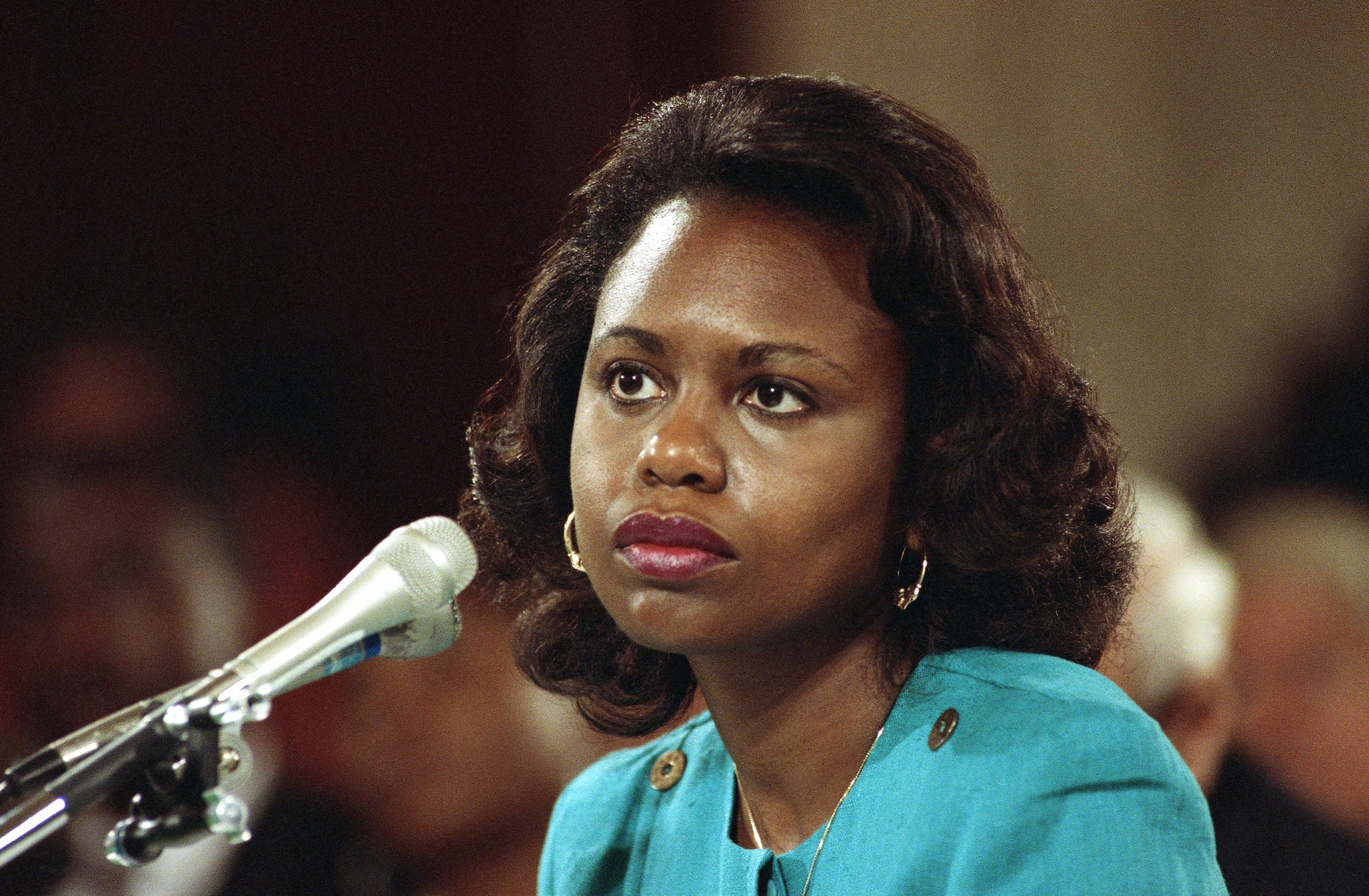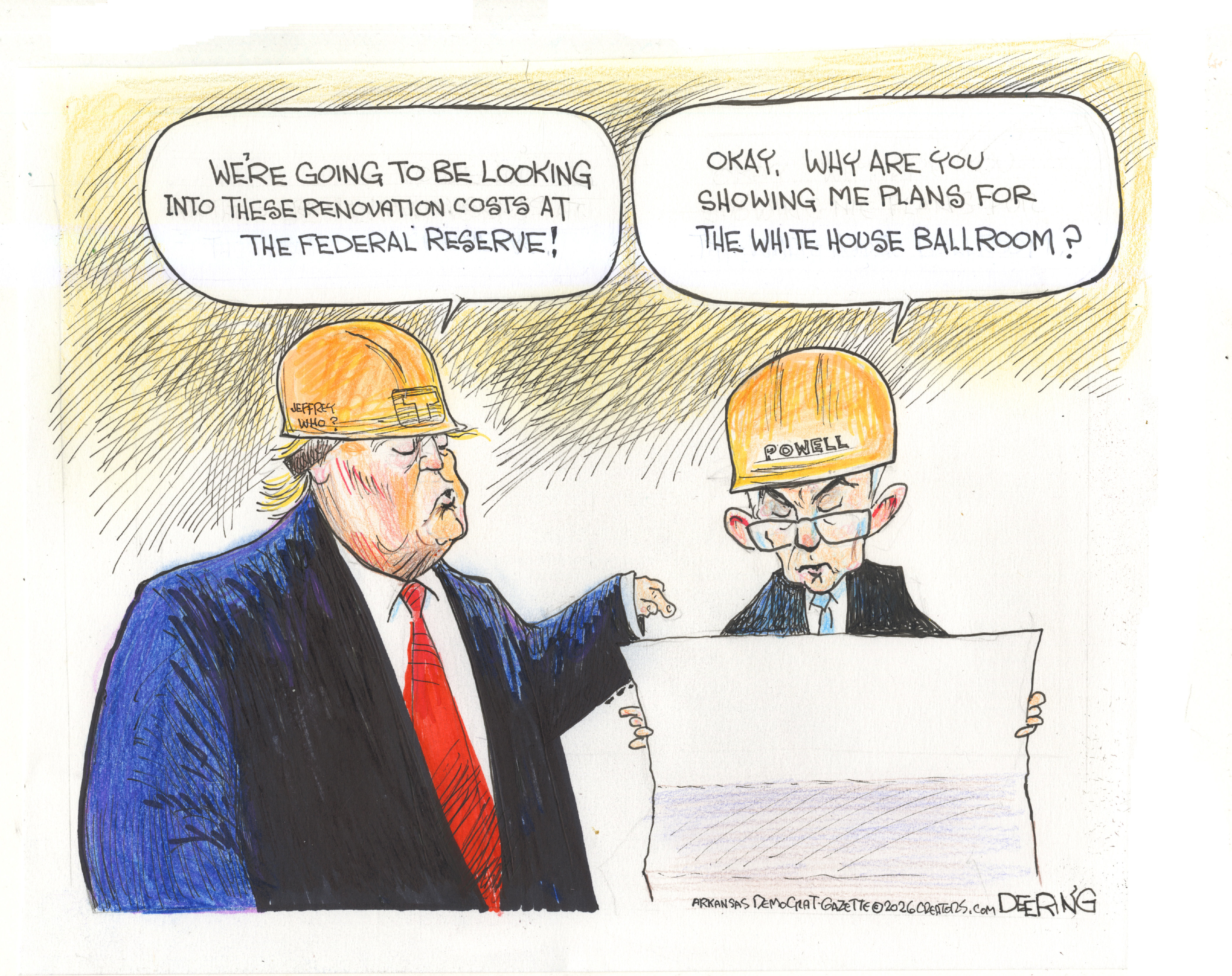The depressingly long history of sexual harassment turning points
Here's how we got to the #MeToo reckoning


This certainly feels like a revolution.
In this case, the shot heard around the world was an Oct. 5 article in The New York Times in which Jodi Kantor and Megan Twohey detailed decades of alleged sexual abuse and sexual assault by powerful Hollywood producer Harvey Weinstein. Within days, he was sacked from his own company and a national pariah — the first of several men relegated to the public wilderness. The subsequent public reckoning on sexual harassment and other crimes and misdemeanors, encapsulated in the hashtag #MeToo, has spread to Britain, Israel, Italy, South Africa, and elsewhere. It has engulfed America.
There is a long and growing creep list of famous and less-famous men accused of varying degrees of sexual misconduct. That list probably already includes someone you admired or respected, and someone you loathed. It will grow longer before there is a new accepted standard on what constitutes a fireable offense, what level of lechery merits ostracizing, or whether there will be any chance of redemption, but those aren't questions for today. Now, finally, the women are believed. Fame, power, being good at your job or great at your art won't protect you. Things you did "in private" are private no more.
The Week
Escape your echo chamber. Get the facts behind the news, plus analysis from multiple perspectives.

Sign up for The Week's Free Newsletters
From our morning news briefing to a weekly Good News Newsletter, get the best of The Week delivered directly to your inbox.
From our morning news briefing to a weekly Good News Newsletter, get the best of The Week delivered directly to your inbox.
There's only one morally appropriate response to these changes: Good. You might also reasonably ask: What took so long?
Revolutions don't spring overnight, and history doesn't unfold in a straight line. Every person who has taken the courageous step of coming forward with her or his story of rape, abuse, or harassment has lit a candle in the darkness where sexual predators hide, and the lumens from the #MeToo uprising are so bright only the willfully blind can't see the scope of the problem. But there are certain moments over the past 40 years that have shifted the standards of what acts can be held to account and what polite society will no longer tolerate. We'll start with the birth of the phrase "sexual harassment."
1. Carmita Wood vs. Cornell University
In 1975, Carmita Wood filed for unemployment benefits from her former employer, Cornell University, after she quit due to unwanted touching by her male supervisor and Cornell's rejection of her transfer request. Cornell refused, saying she had quit for "personal reasons," and a new group, Working Women United, was born. In April 1975, Cornell instructor Lin Farley used the phrase "sexual harassment" at a hearing of the New York City Human Rights Commission. After The New York Times reported on the hearing, the phrase — and the concept — entered the national lexicon.
A free daily email with the biggest news stories of the day – and the best features from TheWeek.com
"At first, it felt as if the term had the potential to change everything," Farley wrote in the Times last month. "Now women could share stories and strategies. They understood that they weren't alone, that millions of working women shared their experience. It was as if a light had been turned on in a dark room." Disappointingly, she adds, "the working women's revolution I once envisioned hasn't happened" and "the term, which once held so much promise, has been co-opted, sanitized, stripped of its power to shock, disturb, and galvanize." It also led to court cases that enshrined a woman's right to sue employers for sexual harassment.
2. Anita Hill vs. Clarence Thomas
In 1991, Anita Hill told the Senate Judiciary Committee in a confidential statement that Clarence Thomas, President George H.W. Bush's pick for a Supreme Court seat, had sexually harassed her 10 years prior, when he was her supervisor at the Department of Education and the Equal Employment Opportunity Commission. Days before Thomas was expected to face a confirmation vote, somebody leaked Hill's statement to the press, and her subsequent live testimony — about a pubic hair on a Coke can, memorably, and Thomas bragging about his sexual prowess — was a national event.
On the new medium of cable news, people debated how to pronounce sexual harassment (ha-RASS-ment or, oddly, HAIR-assment) — the phrase coined just 16 years earlier — and what it meant. Then Thomas veered the discussion from sex to race, accusing the Democratic-led panel of conducting "a high-tech lynching for uppity blacks." He was confirmed 52-48.
The Anita Hill hearings "constituted one of the great truly feminist events of the modern era," recalls Caitlin Flanagan at The Atlantic. In a "highly analog version of #MeToo," and "to the surprise of millions of men, the nation turned out to be full of women — of all political stripes and socioeconomic backgrounds — who'd had to put up with hell at work." Even though Thomas got his lifetime seat on the Supreme Court, "something in the country had changed about women and work and the range of things men could do to them there," she said. "Then Bubba came along and blew up the tracks."
3. House Republicans vs. Bill Clinton
If Anita Hill made sexual harassment a potentially job-threatening action, House Republicans, special prosecutor Kenneth Starr, and a host of other actors, including Matt Drudge and Linda Tripp, set a new standard for what was publicly acceptable behavior for the highest office in the land. Before Bill Clinton, presidents were rumored to have kept mistresses and slept with female aides — most famously but not uniquely John F. Kennedy — but such rumors were not fit to chase down for print, and the public was either contemporaneously unaware or unwilling to delve into a president's private affairs.
Starr's federal investigation into Clinton's failed Whitewater real estate deal veered into sexual territory when Clinton lied about having "sexual relations" with an intern, Monica Lewinsky, and Starr published an explicit report detailing their sexual history. House Republicans impeached Clinton in 1998 for lying under oath and obstruction of justice, and one of the results was that presidents can no longer expect sexual misbehavior to remain "private."
There were immediate ripples. House Speaker Newt Gringrich, who was having an affair with his current wife during the impeachment lead-up, quit after Republicans took a big hit in the 1998 midterms, and his successor, Rep. Bob Livingston (R-La.), stepped down on the same day the House voted to impeach Clinton, because Livingston's own extramarital affair had become public. "How many more good people are going to be destroyed next by Christmas?" asked Rep. David R. Obey (D-Wis.), a friend of Livingston's. "What are we going to do? Line them all up and mow them down?"
The man who stepped in as speaker after Livingston, Dennis Hastert, went to prison in 2016 for sexually molesting high school wrestlers when he was their coach.
4. The Boston Globe vs. the Catholic Church
In 2002, The Boston Globe began a series of articles exposing the cover-up of clerical child sexual abuse in Boston's Catholic archdiocese, including shuffling abuser priests around to different dioceses after stays at treatment centers, without informing the new diocese of the past abuse. The reports led to Boston Archbishop Bernard Law being ousted and transferred to Rome, and a national reckoning in the U.S. Catholic Church that has since spread to Ireland, Australia, and other countries.
Sex abuse by priests and religious orders had been going on for at least decades — the Survivors Network of those Abused by Priests (SNAP), which gained prominence and a hearing with Catholic bishops during the post-Globe scandal, was founded in 1989. Other religions and denominations have their own sex abuse problems — some of them are now having to face them publicly — but the Catholic Church was the 500-pound gorilla. Now that the scope of the problem is public knowledge, the Catholic Church is still dealing with the fallout and hit to its moral authority.
5. Hannibal Buress and dozens of women vs. Bill Cosby
In 2014, comedian Hannibal Buress told a pointed joke about Bill Cosby raping women, and a clip of his act went viral on YouTube, starting a chain of events that has left Cosby persona non grata. By July, at least 35 women had come forward with similar stories of Cosby drugging and assaulting or raping them, including former models Beverly Johnson and Janice Dickinson, and this summer, one of his accusers, Andrea Constand, finally got her day in court. Cosby walked free because of a hung jury, but a formerly Teflon-coated celebrity's decades of sexual abuse had finally stuck to him, and the world watched as his reputation crumbled to dust.
6. Gretchen Carlson vs. Roger Ailes and Fox News
Former Fox News anchor Gretchen Carlson added news media chieftains to the list of felled sexual abusers when Fox News ousted chairman and CEO Roger Ailes in July 2016, weeks after Carlson had sued him for sexual harassment, apparently armed with damning recordings. Soon, other former and current Fox News employees came forward with stories of Ailes' sexual harassment, including Megyn Kelly, Andrea Tantaros, Alisyn Camerota, and Julie Roginsky.
Fox News then fired its top-rated pundit, Bill O'Reilly, in April after The New York Times disclosed that O'Reilly and his network had paid $13 million to settle sexual harassment and verbal abuse accusations made by five women since 2002; later, the Times reported that O'Reilly had also settled a sexual harassment lawsuit for $32 million with the network's knowledge. In May, Fox News parted ways with co-president Bill Shine.
7. Access Hollywood vs. Donald Trump
Before he ran for president, Donald Trump laughed off the idea, telling Chris Matthews in 1999: "How about me with the women? Can you imagine?" In the mid-2000s, he was pretty open about his promiscuous past on Howard Stern's radio show. But it wasn't until The Washington Post posted hot-mic footage in October 2016 of Trump lewdly bragging about trying to seduce married women and sexually assaulting them during a 2005 Access Hollywood segment — and Trump's subsequent denial in a presidential debate that he ever grabbed or forcibly kissed any women — that the floodgates opened. More than a dozen women came forward with stories of Trump kissing, groping, and fondling them after the Billy Bush–Access Hollywood tape.
Trump, of course, was elected president anyway. But this moment of reckoning "is a national moment, and you don't get moments without a trigger," argues Rex Huppke at the Chicago Tribune. "That trigger may well have been the sight of a man with a long history of loutish behavior becoming president of the United States. ... Something led to this avalanche of sexual harassment and sexual assault allegations against powerful men in entertainment, politics, and the media, and I wonder if it wasn't, at least in part, the election of Donald Trump."
Peter has worked as a news and culture writer and editor at The Week since the site's launch in 2008. He covers politics, world affairs, religion and cultural currents. His journalism career began as a copy editor at a financial newswire and has included editorial positions at The New York Times Magazine, Facts on File, and Oregon State University.
-
 Political cartoons for January 17
Political cartoons for January 17Cartoons Saturday’s political cartoons include hard hats, compliance, and more
-
 Ultimate pasta alla Norma
Ultimate pasta alla NormaThe Week Recommends White miso and eggplant enrich the flavour of this classic pasta dish
-
 Death in Minneapolis: a shooting dividing the US
Death in Minneapolis: a shooting dividing the USIn the Spotlight Federal response to Renee Good’s shooting suggest priority is ‘vilifying Trump’s perceived enemies rather than informing the public’
-
 The billionaires’ wealth tax: a catastrophe for California?
The billionaires’ wealth tax: a catastrophe for California?Talking Point Peter Thiel and Larry Page preparing to change state residency
-
 Bari Weiss’ ‘60 Minutes’ scandal is about more than one report
Bari Weiss’ ‘60 Minutes’ scandal is about more than one reportIN THE SPOTLIGHT By blocking an approved segment on a controversial prison holding US deportees in El Salvador, the editor-in-chief of CBS News has become the main story
-
 Has Zohran Mamdani shown the Democrats how to win again?
Has Zohran Mamdani shown the Democrats how to win again?Today’s Big Question New York City mayoral election touted as victory for left-wing populists but moderate centrist wins elsewhere present more complex path for Democratic Party
-
 Millions turn out for anti-Trump ‘No Kings’ rallies
Millions turn out for anti-Trump ‘No Kings’ ralliesSpeed Read An estimated 7 million people participated, 2 million more than at the first ‘No Kings’ protest in June
-
 Ghislaine Maxwell: angling for a Trump pardon
Ghislaine Maxwell: angling for a Trump pardonTalking Point Convicted sex trafficker's testimony could shed new light on president's links to Jeffrey Epstein
-
 The last words and final moments of 40 presidents
The last words and final moments of 40 presidentsThe Explainer Some are eloquent quotes worthy of the holders of the highest office in the nation, and others... aren't
-
 The JFK files: the truth at last?
The JFK files: the truth at last?In The Spotlight More than 64,000 previously classified documents relating the 1963 assassination of John F. Kennedy have been released by the Trump administration
-
 'Seriously, not literally': how should the world take Donald Trump?
'Seriously, not literally': how should the world take Donald Trump?Today's big question White House rhetoric and reality look likely to become increasingly blurred
